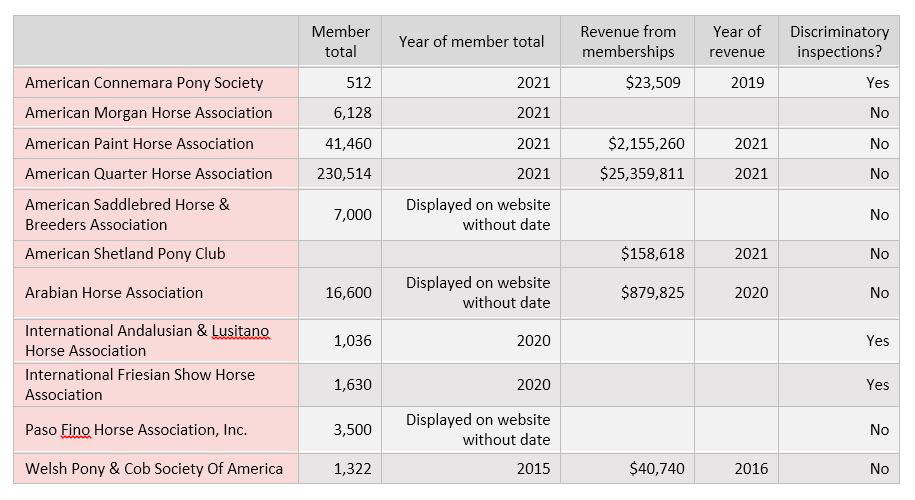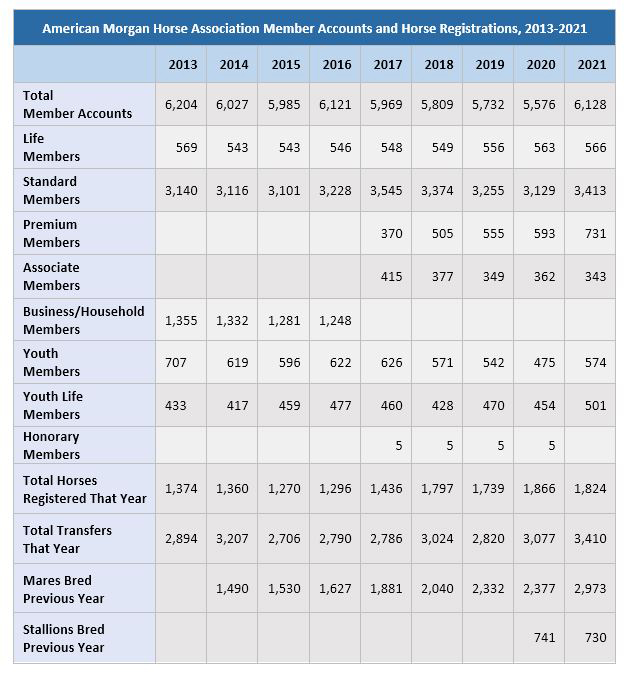ACPS membership plunge of 38 percent coincides with inspections; new code of conduct may prevent criticism
The numbers always tell the story, and a steep drop in membership for the American Connemara Pony Society tells a story of failure by top ACPS officials over a 20-year period.
The following table provides American Connemara Pony Society membership numbers for the years 1960 to 2020, with a lot of gaps due to lack of published numbers. As you can see from the top gray-shaded row, total membership numbers fell to 520 in 2020 from 834 in 2000, a drop of about 38 percent.
American Connemara Pony Society membership
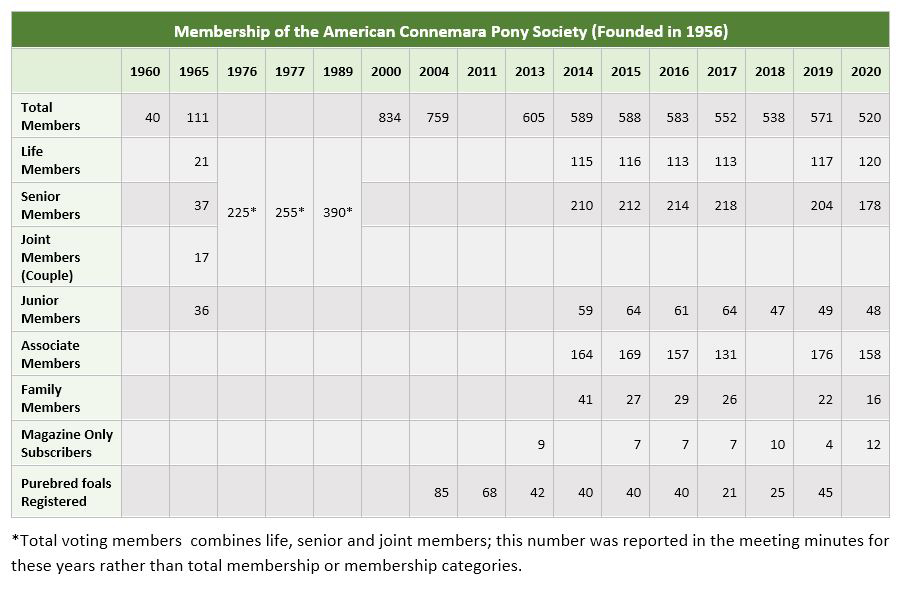
Source: ACPS board of governors meeting reports and ACPS Stud Book II and III secretary reports
The membership peak in 2000 was just before the ACPS implemented mandatory inspections for a Connemara to be included in a new stud book, separate from a registry for uninspected and unapproved horses that would now be put in the category of undesirables.
The two-class system was based on the following stellar plan:
Three people with clipboards and no other qualifications (no need to have any riding, training or judging experience) were given the power to say a Connemara was premium or approved, or not approved, based on a 12-minute glance, with the Connemara walking and trotting once in hand. Refusing to trot at a decent pace does not prevent a Connemara from being approved (my observation at an inspection). Breeders are welcome as inspectors. Most, maybe all, inspectors are in fact breeders, judging the offspring of their direct competitors.
The ACPS says on its website: “In 2001, it was decided to establish an ACPS Stud Book listing inspected and approved ponies, separate from the ACPS Registry. This ‘two-tiered’ system thus brought the ACPS closer to meeting all of the criteria for approved membership status in the ICCPS (International Committee of Connemara Pony Societies).”
And that two-tiered class system is about to get more extreme, but I’ll get to that below.
ICCPS membership
The ACPS said again at the February 2022 board of governor’s meeting: “It is because of the inspection program [that] the ACPS is a member of the ICCPS.”
The ICCPS was formed in 1988.
The ACPS was formed in 1956 and doing quite well in serving American owners of Connemaras before its whole focus changed to wanting to be part of the international society.
Let’s discuss what horse owners get out of these inspections and ICCPS membership that’s worth running the ACPS into the ground to keep.
Owners of premium or approved horses get a fancy seal on their registration papers and their horse’s name is added to the ICCPS registry. That’s a database that is supposed to be put together by this international society, which seems a bit unprofessional and unlikely to publish the database in our lifetime, based on recent ACPS reports.
The following quote appears in the ACPS Word document titled: “2020-01-11_acps-meeting-minutes_west-palm-beach-florida.docx”: “The ICCPS is also still trying to combine with [sic] stud book information from all of the international groups to form the World Wide Database, but it has been a long and hard struggle with no end in sight.”
Someone else could create that database without the ACPS joining the ICCPS. There’s a woman in Sweden who has created a Connemara database in her spare time for a personal website, Tephra.se, which is the only public database I trust for looking up Connemara bloodlines (it’s back up an running after a technical issue. Woohoo!). Building a quality database doesn’t require killing the ACPS.
Arabian database makes money for Arabian Horse Association
An example of another breed’s database is a subscriber-only database offered by the Arabian Horse Association that makes money for the group. I was tempted to pay myself to play with it. Users can search more than 550,000 US and foreign owners and breeders.
Horse association membership totals in the US
I’ve hunted down membership totals for several horse associations in the US (American Morgan Horse Association, American Paint Horse Association, American Quarter Horse Association, American Saddlebred Horse & Breeders Association, American Shetland Pony Club, Arabian Horse Association, International Andalusian & Lusitano Horse Association, International Friesian Horse Show Association, Paso Fino Horse Association, and Welsh Pony & Cob Society of America). Here’s my list so far. I’ve included which groups have inspections that are discriminatory and limit horses that get approved. The membership totals for those groups are some of the lowest. I guess the inspections are working and keeping horses and their owners out. One might wonder where the tipping point is on exclusion versus extinction.
Table of horse association membership totals in the US
Source: Association websites, annual reports, IRS filings
Critical question for Connemara breeders
Returning to the Connemara situation: Perhaps the most important metric is whether US owners are selling more Connemaras because of the potential database their horses will appear in someday? Well, there are far fewer people interested in Connemaras in the United States, with ACPS membership down 314 members from a small base, so I would say no. If inspections and the divisiveness that came with them hadn’t decimated the society, and membership had increased or stayed the same, would owners be selling more Connemaras than they are? I believe they would.
Wrong inspections for today’s world
I’d like to reiterate one last time that this attitude of “my pony is way better than your pony forever more because three playground bullies said so” is never going to stand the test of time in a world that no longer tolerates bullies or discrimination. When the bullies are using anti-diversity as their yardstick, forcing all Connemaras to meet some cookie cutter description created by owners whose own horses fit that description, the whole thing smells so much worse.
ACPS membership sources
I pulled the ACPS membership totals in my table from published information, mostly from annual meeting reports. The reporting in those is a bit inconsistent. Still, the membership trend is clear. I will continue to try to fill in the gaps in my membership table until the society publishes its own table publicly on its website.
The foal numbers are very difficult to track by this method. Some reports providing the annual foal crop number don’t say if the number is for purebreds or all foals, so I’m unsure.
Other societies are not afraid to report their horse numbers by detailed category.
American Morgan Horse Association membership is in better shape
I thought it might be helpful to compare ACPS membership to American Morgan Horse Association membership, published in annual reports.
Remember in 2017 when Denny Emerson addressed the ACPS and AMHA on Facebook and said both societies should do something, anything, to save their breeds because wishing wouldn’t make it so? Emerson was repeating what he had told the ACPS in person as a guest speaker at an annual meeting.
Based on his comments, I mistakenly thought that AMHA membership was at the same low level as ACPS membership. It’s not. AMHA membership numbers are in the thousands and doing just fine.
For clarity, I used the AMHA membership numbers published originally each year, not any slight revisions published later, since no explanation was provided for the revision, and I wasn’t sure what the revised number was. I had to pick a consistent methodology, and that’s what I went with.
American Morgan Horse Association membership
Source: Annual reports of the American Morgan Horse Association
Since Emerson made his comments in 2017, Morgan membership has risen a little, while ACPS membership has fallen from a much smaller base.
The Morgan association’s 2021 annual report is a nice example of how to present yearly totals, if a society has someone who can take the time to do it. Still, I’d like to see the numbers in a table.
The American Quarter Horse Association is not afraid to display its membership in this amazing table from its data-filled annual report, posted on its website.
American Quarter Horse Association membership totals by year, 1986 to 2021
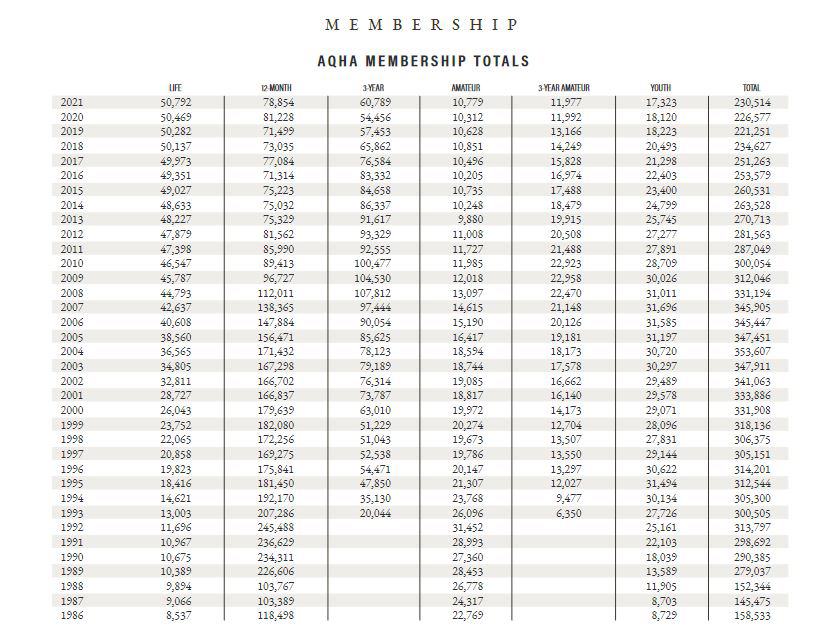
Source: 2021 Annual Report of the American Quarter Horse Association
The Jockey Club does a fabulous job with its state tables of horse numbers. Click here for the 2022 Kentucky report.
The world today is about data. If you hide your data, people think you’re hiding many other things. “Why are you hiding things?” they ask, before looking elsewhere for a horse community to join and support.
The ACPS’ total of 520 members in 2020 is not a true reflection of participation. That number includes 120 life members, accounting for 23 percent of members. The life memberships include me, my brother, who has been out of horses for at least 20 years, and potentially my dad, who died in 2020. I suspect the ACPS has not had my dad’s correct address for years, because he moved several times, but I’m not sure if the society removes life members whose mail is returned unless officially notified that they died. And if the society isn’t removing them, how many potentially deceased members are inflating the total?
Taking the pony caste system to a new level
Let’s get back to the two-tiered caste system in the ACPS.
Kathy Sparks, head of inspections, reported at the January 2020 ACPS meeting: “A suggestion was proposed at the board meeting to have a class at our shows only for inspected and approved ponies.” You’ll find that quote in the document 2020-01-11_acps-meeting-minutes_west-palm-beach-florida.docx
She added: “We encourage show managers and show committees to consider adding such a class to their prize lists.”
Who didn’t see that coming? So now the uninspected horses are cut off from show classes and prize money that are available to approved Connemaras — which were given the approved title by breeder inspectors — because those breeder inspectors made inspection rules favoring their breeding stock. Isn’t there an antitrust lawsuit in there somewhere?
Sparks also said this: “Premium status is something to be extremely proud of achieving — one breeders and owners should celebrate.”
Not true. Breeders and owners do nothing but let three people with clipboards circle them to gain that status. “Achievement” is a joke. Owners drive to the inspection site, hopefully without incident. That counts for something but not much. And, many times, the inspectors go to the horses at their farm.
And Sparks said this:
“The Inspection Committee and inspectors have perhaps the most important role in the society, one of seeing that we maintain and preserve our breed standard.”
Well, they sure think they’re important, don’t they?
Michael O’Malley wanted to save a Connemara with spirit
Don’t forget that the Connemara breed standard for a big-boned pony was created in spite of opposition from Michael O’Malley, who is the one and only person credited with saving the Connemara in the early 1900s. O’Malley was outspoken in wanting refined ponies to be part of a breed standard, and he wanted the breed standard to focus on spirit and stamina. Many of his contemporary Connemara breeders agreed with him. It’s all in print in their own words.
If a premium or approved Connemara has spirit or stamina these days, it’s totally by coincidence. That Connemara could be the deadest, rankest pony on the planet and still waving a premium label from inspectors.
Carna Bobby’s Thoroughbred genes are everywhere
Also, don’t forget that Carna Bobby’s bloodlines were found in the most Connemara offspring in a study released in 2003 by Ireland’s Department of Agriculture, Food and Rural Development, and Carna Bobby is three-quarters Thoroughbred.
The study, titled “Characterization of the Connemara Pony Population in Ireland,” said stallion Carna Bobby was the most important ancestor to the two studied horse populations, whose combined total was 5,160 Connemaras.
Carna Bobby’s genes contributed nearly 14 percent to the genes of the reference populations.
Study authors threw in this explosive comment: “Overall, the contributions made by the ancestors of the reference populations were found to be very unequal, with six ancestors contributing 50 percent of the genes to both of the reference populations.”
Irish breeder Bobby Bolger, whose father bred Carna Bobby, is on the record as saying that Carna Bobby’s sire was a Thoroughbred at his father’s farm, not Connemara fullbred Gil, as shown on Carna Bobby’s papers. This was included in an interview that Bobby Bolger gave with Niamh O’Dochartaigh for the book “A Way with Horses,” published in 2005.
Here’s the reference.
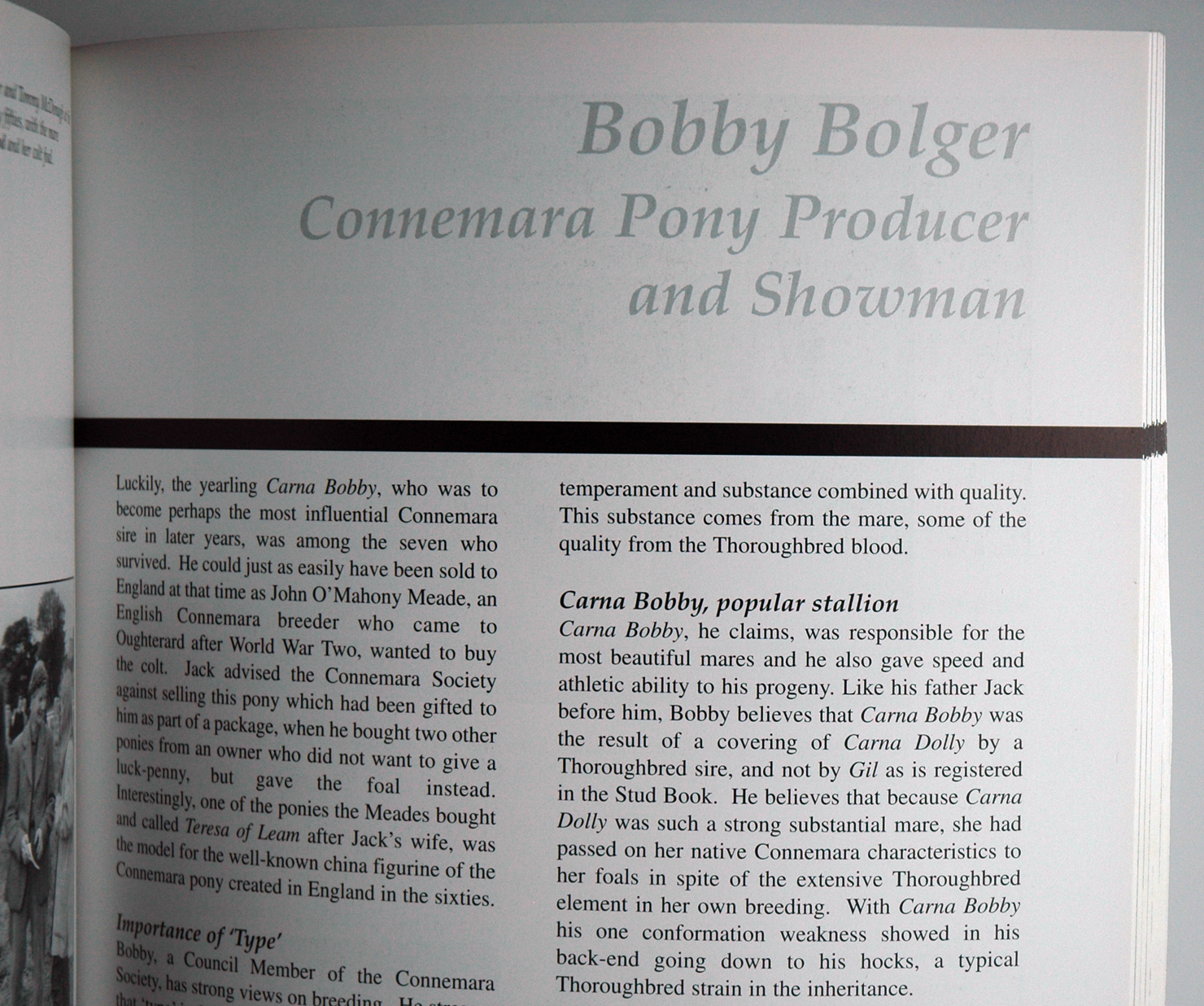
Stallion Carna Bobby is three quarters Thoroughbred, according to Bobby Bolger, whose father bred the stallion.
Carna Bobby’s dam, Carna Dolly, was a half-Thoroughbred. She was by Thoroughbred stallion Buckna out of Colleen Bawn, whose papers show only her Connemara sire and nothing for the dam, so who knows whether Colleen Bawn is really a fullbred Connemara.
So Carna Bobby, the most used stallion in the history of the Connemara, was spreading Thoroughbred genes and Thoroughbred features everywhere. I counted his foals on Tephra.se. I got 340 offspring.
And we know that Thoroughbred Little Heaven’s genes were spread far and wide by sons Carna Dun in Ireland (317 offspring) and *Texas Hope (99 offspring) in the US, with *Texas Hope being the most popular stallion in America from the mid-1950s to the mid-1970s.
Explain to me again why ACPS officials are so dead set against Connemaras having any Thoroughbred features?
Deliberately hiding that heritage is so offensive. So bigoted. So wrong. And, in humans, such blatant discrimination is illegal.
Inspections are pushing a breed standard that has nothing to do with the historical facts and are ruining the breed because the current inspections process puts lipstick on a potentially dead-sided or dangerous horse.
Video training for inspections
Inspector Sarah Thrasher reported at the January 2022 meeting that the Inspections Committee is hard at work creating online videos for inspector candidate training and continued education.
Videos are not going to improve the inspections program.
For two decades, the program has allowed people who have never cantered a horse from a walk — people who have never felt what it takes for a horse to collect itself under them and use that energy to accelerate forward — to tell seasoned riders how to judge horse conformation and whether those seasoned riders’ horses are premium quality. Who wouldn’t want that?
Which is why you have Connemara inspection criteria that say some length of back is acceptable in a premium Connemara. Not if you want a Connemara that can easily canter from a walk. But, again, if you don’t ride, you don’t care that your inspections are so misguided.
New code of conduct instituted
Also, if you are new to the ACPS and want to join, you must now sign a code of conduct, according to the January 2022 board of governor minutes. I guess that’s a muzzle for critics like me. The wording of the code of conduct was not provided.
Members haven’t been able to criticize ACPS officials for decades, so that’s not new. The officials have very thin skin. Think Putin. Now, perhaps the ACPS is giving itself cover to kick out a member should the member object to anything. Where I come from, that’s called a dictatorship.
What I know for sure is everything I’ve written in the past has been the polite version of the post I wanted to write.
The board members already have signed the code of conduct, according to the 2022 meeting report.
I have not seen the code, but I would like to run through some scenarios and see if the code covers these behaviors. Before I get to them, I have two questions for you.
1) Would there be any meaning to George Santos, who lied his way into winning a seat in the US House in 2022, signing a code of conduct now? He already got what he wanted. He’d probably sign anything now. It would be a useless piece of paper.
2) If you forced reporters at the US Capitol to sign a code of conduct that barred them from saying anything bad about lawmakers, preventing them from outing Santos’ littany of lies (obviously none of that is going to happen), is that what you want? Is that what the ACPS wants?
Hypothetical Case 1
The new code of conduct could say that no member is allowed to criticize another member.
What would happen if, hypothetically, an ACPS official in a fit of rage over being told to rein in spending at her farm, decided to shoot some of her older horses, claiming she couldn’t afford a vet, even though vets had been putting down her horses with injections for decades and would have let her run a tab to put down those older horses. Hypothetically, the horses she shot could include a gelding recently sent back to her by another ACPS official and a broodmare gifted to her by someone thinking the horse was landing at a great forever home. Hypothetically, she could have told the fellow ACPS official to keep the gelding or she would shoot it, but, hypothetically, she said nothing. Hypothetically, the mare could have gone to another ACPS member who wanted to take the mare a few years earlier, but that call was not made, either. Hypothetically, it’s hard to throw a gun-slinging temper tantrum over money if one considers the welfare of the Connemara first and allows the Connemara to have a more humane option. Shooting a horse is not illegal, but the American Veterinary Medical Association says amateurs should not shoot their horses.
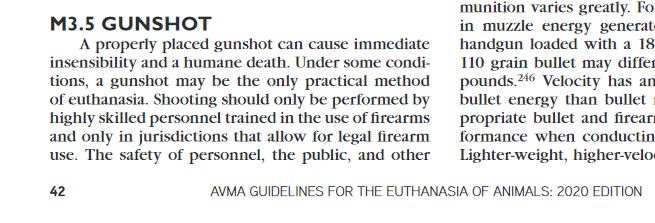
The AVMA says only highly skilled personnel trained in the use of firearms should attempt to shoot a horse to euthanize it.
What if, hypothetically, word of these temper-tantrum shootings spread quickly throughout the area by neighbors, vets, farriers and others, including to other Connemara farms where ACPS members lived and, hypothetically, even to vets who were ACPS members? What if, hypothetically, many of these people openly mocked the behavior but didn’t report it to the society? What if, hypothetically, the ACPS official who sent the gelding back learned of the shootings, potentially telling other ACPS officials about the shootings, but not making the behavior known to the general ACPS membership? What if, hypothetically, this allowed this ACPS official to inspect members’ horses for many years, pretending to be a champion of saving the breed, but treating ponies at her own farm like unwanted trash?
Under this hypothetical situation, the only person who would get burned by the code of conduct and kicked out of the ACPS would be the ACPS member who finally stepped up and criticized the ACPS official publicly because the code of conduct would protect all of these various versions of silence and fear. Don’t even bring up the grievance committee. Its only goal seems to be protecting the longtime tight circle of ACPS officials running this society for decades. Think: complaining to Putin about his generals.
Hypothetically, the whole Connemara society looks really bad, laughing-stock bad, from this incident, but mum’s the word. The code of conduct rules.
Hypothetical Case 2
The new code of conduct could say members must treat their horses with respect.
Hypothetically, what if an ACPS official is seen many times locking a young horse in a round pen and beating it bloody with a lunge whip over an hour or more, hypothetically, due to this official’s lack of skill to train a Connemara? What if, hypothetically, other Connemara owners and ACPS members with Connemaras at this location know this, so they don’t let this ACPS official touch their horses, hypothetically instead hiring outside help or asking others to train their horses for free? What if, hypothetically, one ACPS member continues to train this official’s Connemaras, even after this person has nothing to gain from doing so, just to keep the ACPS official from touching her own horses. So, again, hypothetically, a group of ACPS members knows of this behavior.
Hypothetically, this ACPS official has violated the directive from the United States Equestrian Federation (USEF) to affiliates to put the welfare of the horses they serve first.
What if, hypothetically, this ACPS official signs a code of conduct now, but this behavior was in the past? Are past transgressions fine as long as future ones don’t happen under this code of conduct and USEF’s directive? And are ACPS members who describe this behavior now the ones who get burned by the code of conduct, as in Case 1?
Hypothetical Case 3
The new code of conduct could say ACPS members must be transparent and honest with other members.
Hypothetically, what if an ACPS official sells a stallion without disclosing that the stallion seemed to try to kill a rider asked to sit on its back briefly for a photo for that sale? Or, hypothetically sells a Connemara that stands on its hind legs when someone tries to clip it and doesn’t disclose that? Or, hypothetically sells a knowingly rank mare to a new buyer with Irish roots who desperately wants a Connemara, but the new rider gets bucked off and kicked in the head almost immediately, causing her to give away the Connemara as fast as possible? Or an ACPS official hypothetically sells a mare to another ACPS official without disclosing that the mare once put her in the hospital?
Many of us grew up during a time when “horse trading,” as they called it, drew a wink and a nod. But ACPS members now have signed a code of conduct! Is dangerous horse trading allowed under a code of conduct? And, again, is the person who criticizes the ACPS official who hypothetically engages in such underhanded behavior the one who will get burned for speaking out?
Hypothetical Case 4
A new code of conduct could say ACPS members must be respectful to other members in person.
Hypothetically, what if one mild-mannered ACPS official accidentally backs over another ACPS official’s dog that, hypothetically, had curled up under the car’s back tire, and the dog owner hypothetically goes ballistic, screaming, no shrieking, at the top her lungs for what hypothetically seems like an eternity, despite the driver apologizing profusely, offering to drive the dog to the vet and pay all bills. Hypothetically, this ACPS official has engaged in behavior that would get many people locked up and never apologizes later.
How does the code of conduct affect this scenario? And what if this was hypothetically in the past, and this ACPS official has signed the code of conduct now? Shouldn’t the code of conduct be retroactive?
The ultimate code of conduct
I would suggest a code of conduct, if you’re going to have one, that says no registered Connemara can be sold without a complete disclosure list attached, and the list must include all the horse’s transgressions, just as a disclosure list is required for the sale of a house, and failure to list all issues can result in legal ramifications.
Even better would be publishing the names of Connemaras with these disclosure lists on the ACPS website.
Connemaras would be rated on trainability (did it take three days or two years to go from lunge line to saddle?), willingness to go forward (does the horse need to be jabbed with pizza cutter spurs every single step to keep it moving?), athletic ability (is it terrified of crossrails?), show career, clipping temperament, willingness to trailer, ability to handle loud noises and wind gusts, inclination to buck people off, and other important factors.
A complete history of accidents would be mandatory. Driving accidents, too. Wouldn’t want an unsuspecting owner to have a horrible cart accident driving a Connemara that had caused a bad accident with a previous owner?
If a horse had killed someone on the ground, rather than the incident being swept under the rug, details of that incident would be required, so someone looking at similar bloodlines would know the temperament running through those genes, even if the horse involved disappeared.
For already approved horses whose owners continued to advertise that fact, these comments would show how accurate the 12-minute glance was at assessing a Connemara’s real value.
Yes, these suggestions are way over the top!
But if you’re buying a Connemara, do you want to judge a potential purchase by a fake premium label handed out after a brief glance, or do you want to know what the pony will do to you or your child once you get it home?
ACPS says it conducted an inspections survey
The ACPS website page on inspections says it surveyed members extensively in 1990 on the inspections topic. The sentence is worded with “members,” not “all members,” so maybe there’s some fudging going on there as to how many received the survey.
In 1990, my family had four ACPS life members living under one roof, and I have no recollection of seeing this survey.
In 2005, when I did my paper survey of all US members on inspections, I sent out 757 surveys (there were 759 members in the 2004 directory; I did not send a survey to myself or a member in Ireland); 89 members took the survey and sent it back.
That’s an amazing return rate.
There were lovers and haters of my survey in those responses.
People praised me for finally discussing the subject.
Not one person said: “We already did this.” Or “I’ll send you the same comment I sent to the ACPS in its survey.” Not one. Not even the haters. It suggests to me that most members did not see the ACPS survey that the society says it sent.
Please feel free to read the results of my survey of ACPS members on inspections because I published all the votes and comments.
I ask that the ACPS publish the results of its inspections survey, since it has now told everyone that this survey existed. And please include how many people received the survey out of total members. If the survey wasn’t sent to every member, would someone please ask why at the next ACPS meeting? Thank you.
Final comments on inspections
One can tell which ACPS officials are some of the main proponents of inspections, based on the comments I have quoted from the ACPS annual meeting reports. If you love inspections, those are your champions. And one can easily search for the names of the other inspectors on the ACPS website. But know that the society is shrinking and its future may be uncertain under this leadership solely focused on one thing.
If those are not your champions and you already know how worthless these inspections are, then you know this truism, as well:
People with great Connemaras just send them into an open show ring to prove their worth.
Amateurs with clipboards are irrelevant.
